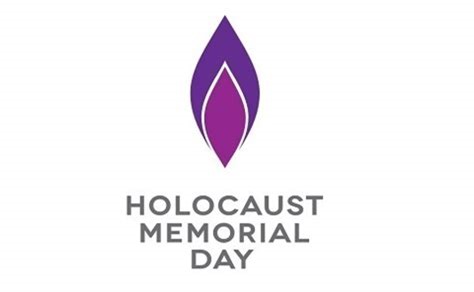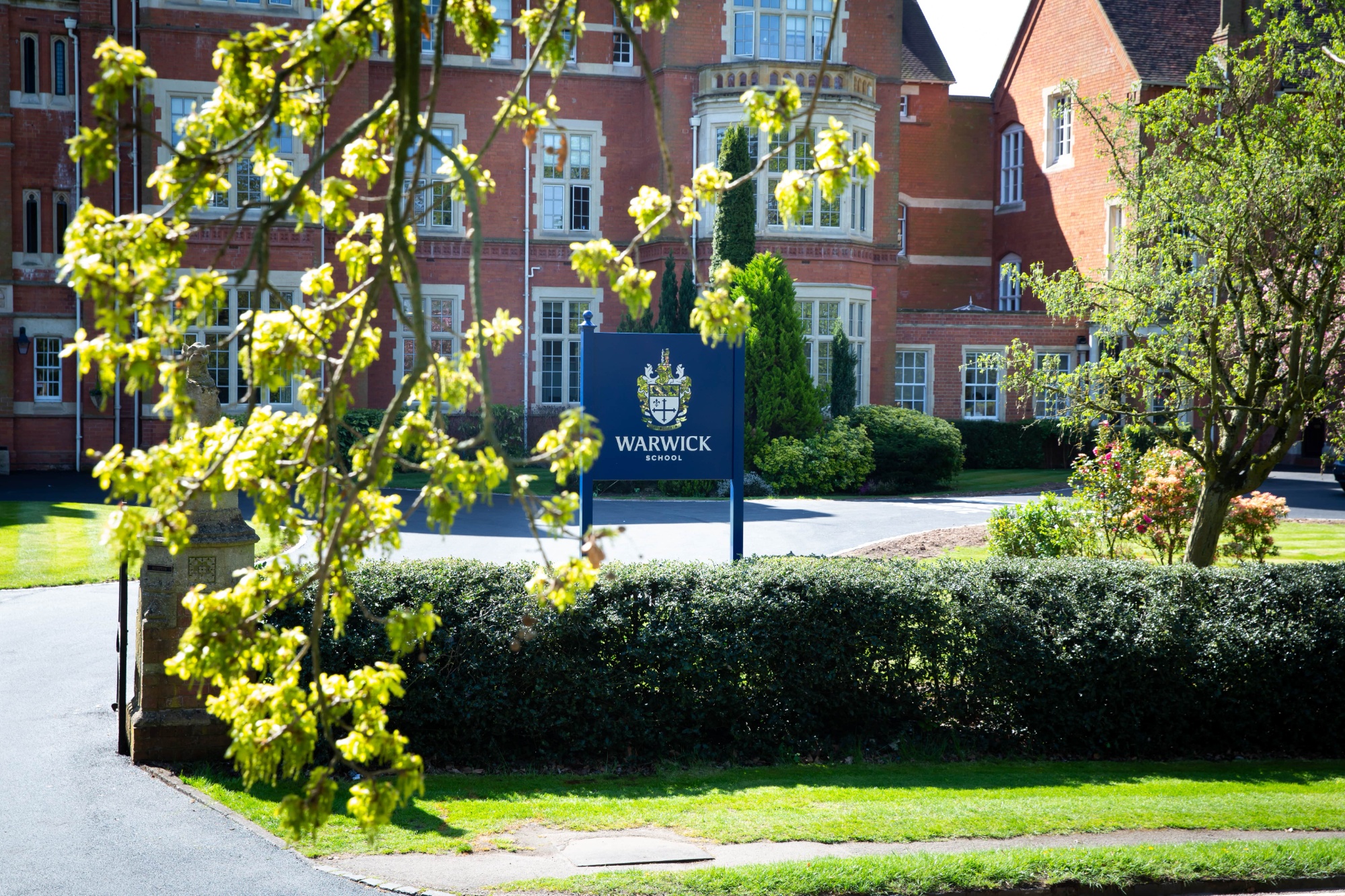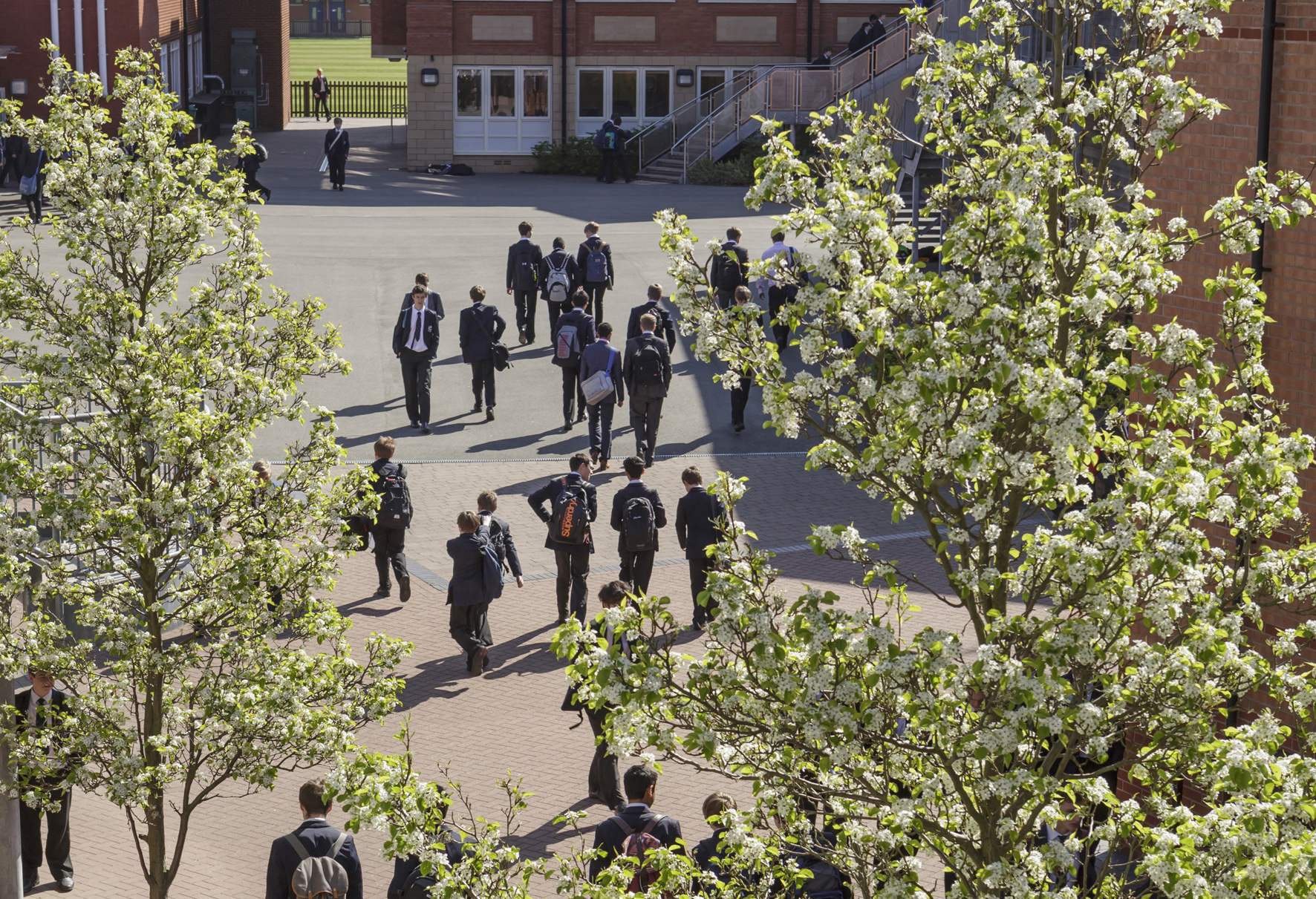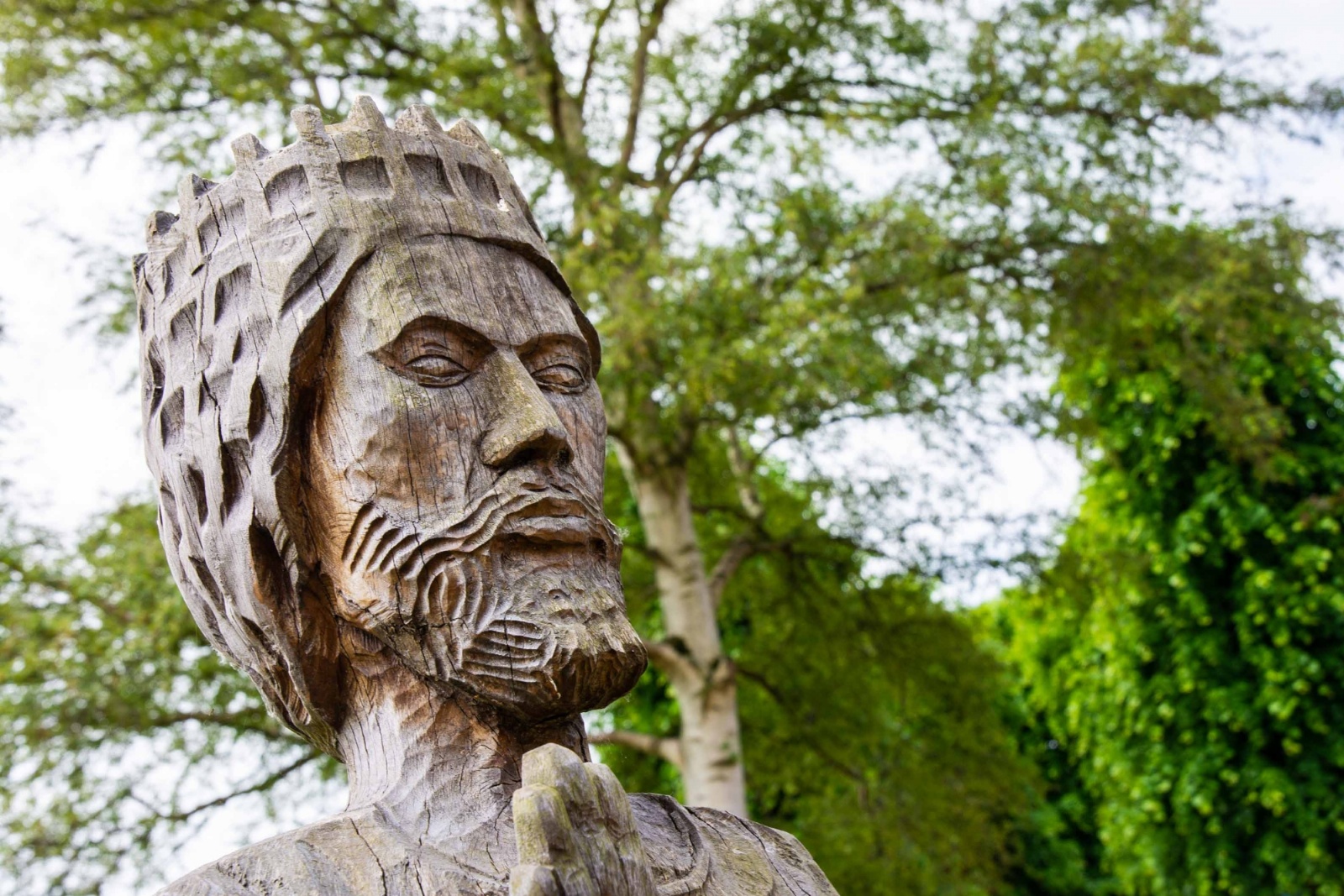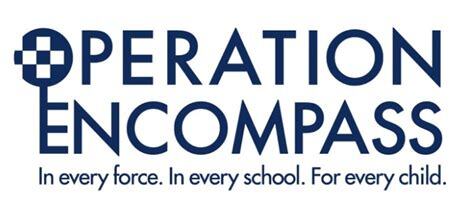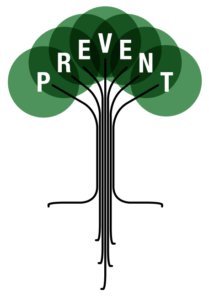The Fragility of Freedom and the Power of Language
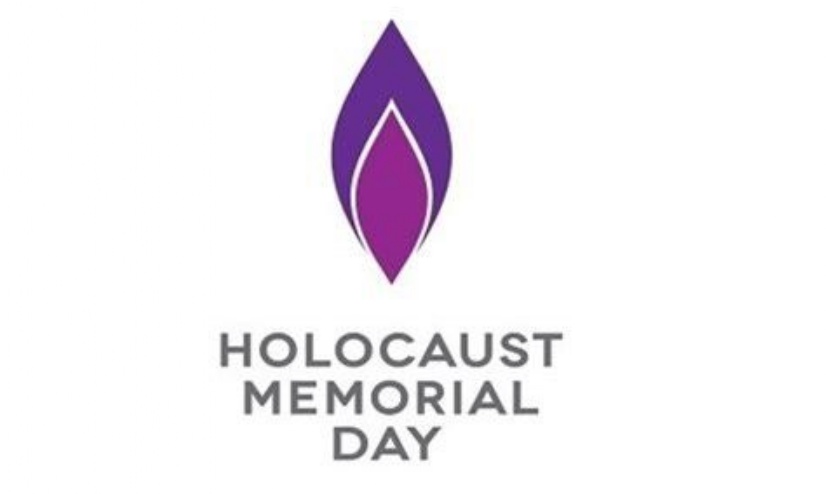
Last Friday was Holocaust Memorial Day. In the United Kingdom Holocaust Memorial Day is a National Day of Commemoration dedicated to remembering those who were persecuted by the Nazi’s. It is marked every year on 27 January the anniversary of the liberation of Auschwitz-Birkenau.
Last week Lower Sixth Former Ryan Taylor read at the Holocaust Memorial Day Service at the war memorial in Warwick. Since Holocaust Memorial Day began, each year it has focused on a particular theme. This year’s theme is the Fragility of Freedom. A theme aligned to the passage Ryan chose, an extract from Phillipe Sands ‘East West Street’ about some of the victims of Kristallnacht.
Phillipe Sands is a specialist in international law. As a practicing barrister he has extensive experience litigating cases before the International Court of Justice and the European court of Justice. He frequently advises governments and international organisations on international law and was appointed a Queen’s Counsel in 2003. East West Street was originally written to tell the story of his Grandfather Leon Buchholz who lived in Lviv and escaped the Holocaust, eventually settling down in Paris after the war. However, in the process of his research Sands discovered that two of the leading figures in establishing international laws at the Nuremburg trials lived in the same town as his grandfather.
On 19 July 1938, Rita (Leon’s wife) gave birth to a daughter, Ruth. Four months later, a lowly official at the German embassy in Paris was murdered, unleashing Kristallnacht and the destruction of Jewish property and businesses.
That night, 9 November, the Leopoldstempel where Rita and Leon were married was burned down, and thousands were rounded up. Among the hundreds who were killed or ‘disappeared’ were two of Leon’s brothers-in-law.
Max Gruber was arrested on 12 November, spending eight days in prison before being released. He was forced to sell off his shop and the building he owned with Gusta, and to do so cheaply.
Rita’s youngest brother, Julius Landes, was less fortunate: he disappeared a few days after Kristallnacht, never to be heard from again.
Freedom means different things to different people. The Holocaust and subsequent genocides in Rwanda, Cambodia and Sudan tell us that we cannot afford to be complacent, and freedom is fragile. In every genocide that has taken place, before the killing started, those who were targeted for persecution had their freedom restricted and removed. This is often a slow and subtle process. Genocide never just happens. There are always a set of circumstances which occur, or are created, to build the climate in which genocide can take place and in a which a regime can remove the freedoms of those they are targeting.
Professor Gregory Stanton, president of Genocide Watch, an international organization that monitors and alerts the world of ongoing or potential genocides and mass atrocities identified ten stages of genocide. It is the later stages, extermination, and persecution that we most closely associate with the concept of genocide and the Holocaust, but it is two of the earlier stages that build the climate in which genocide can take place that I wish to reflect on here.
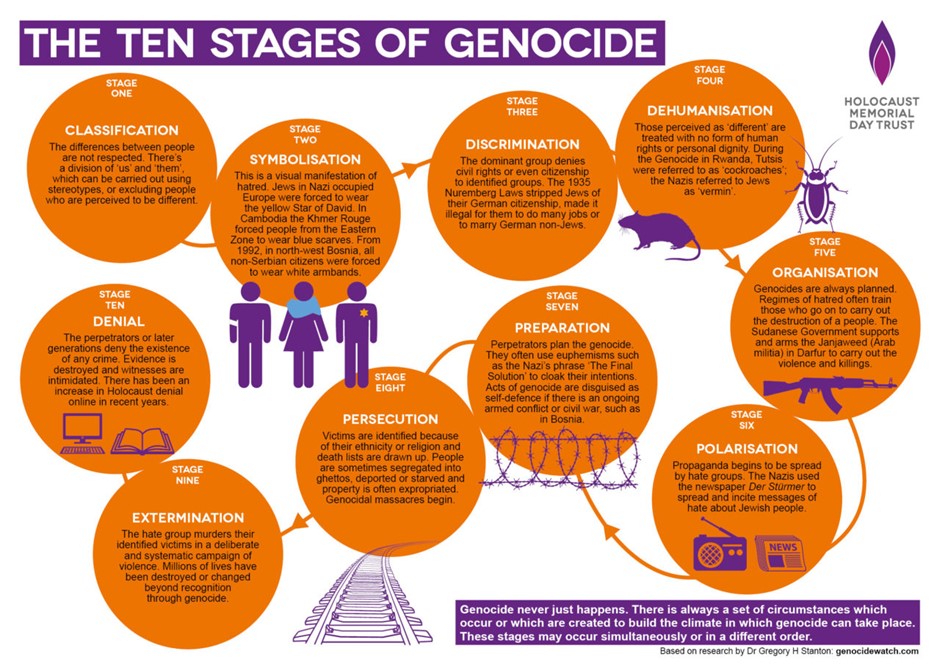
The first is classification – You will all be familiar with the concept stereotype; stereotypes are a fixed mental image of a group of people and often serve to separate society into ‘them’ and ‘us’. That which is like us and that which is different and other. Throughout history Jewish people have often been stereotyped as arrogant, it is claimed by antisemites that the Jews believe that they are better than other people. This and other stereotypes were used by the Nazi’s to separate Jews from the rest of German society and use them as scapegoats for Germany’s problems in the 1930’s.
Classification is an important step toward another stage of genocide, dehumanisation. Dehumanisation occurs when those perceived as different are deemed to be less than human, lose their personal dignity and have their human rights eroded and removed. It is far easier to discriminate against, persecute and exterminate those whom we do not consider to be human and who therefore lack the accompanying rights. The Nazi’s referred to the Jews as vermin and in Rwanda the Tutsis were refrerred to as cockroaches.
And that is why our use of language is so important. By employing stereotypes and the language of prejudice no matter the context, even if we claim that we ‘don’t mean it’ or that it is ‘just a joke’, we are separating society into them and us. Every historical genocide began with language. Language that classified and dehumanised our fellow human beings. Language that made it easier to treat people differently, to remove their freedoms, to discriminate against them, to persecute them and ultimately to murder them. Kristallnacht, the pogrom described by Phillipe Sands in East West Street and the Holocaust were only possible because the perpetrators believed that the Jews were different, that they were not human and therefore did not deserve the same rights and protections as them. Those of us who are lucky enough to live in a modern liberal democracy are probably guilty of taking our freedom for granted but history reminds us that we cannot afford to be careless with it. We may believe that genocide could not happen here but how many of can honestly say that we have not witnessed or been in the presence of at least two of Professor Stanton’s ten stages? When good people hear the language of classification and dehumanisation and do nothing, we are permitting the development of a culture that allows groups to be excluded, have their freedoms denied and become the victims of discrimination. The lesson of Holocaust Memorial Day is that freedom is fragile, it is based on recognition of our common humanity and rights and that we have a responsibility to defend it by having the courage to speak up when we hear others classifying and dehumanising our fellow human beings by employing the language of hate.
